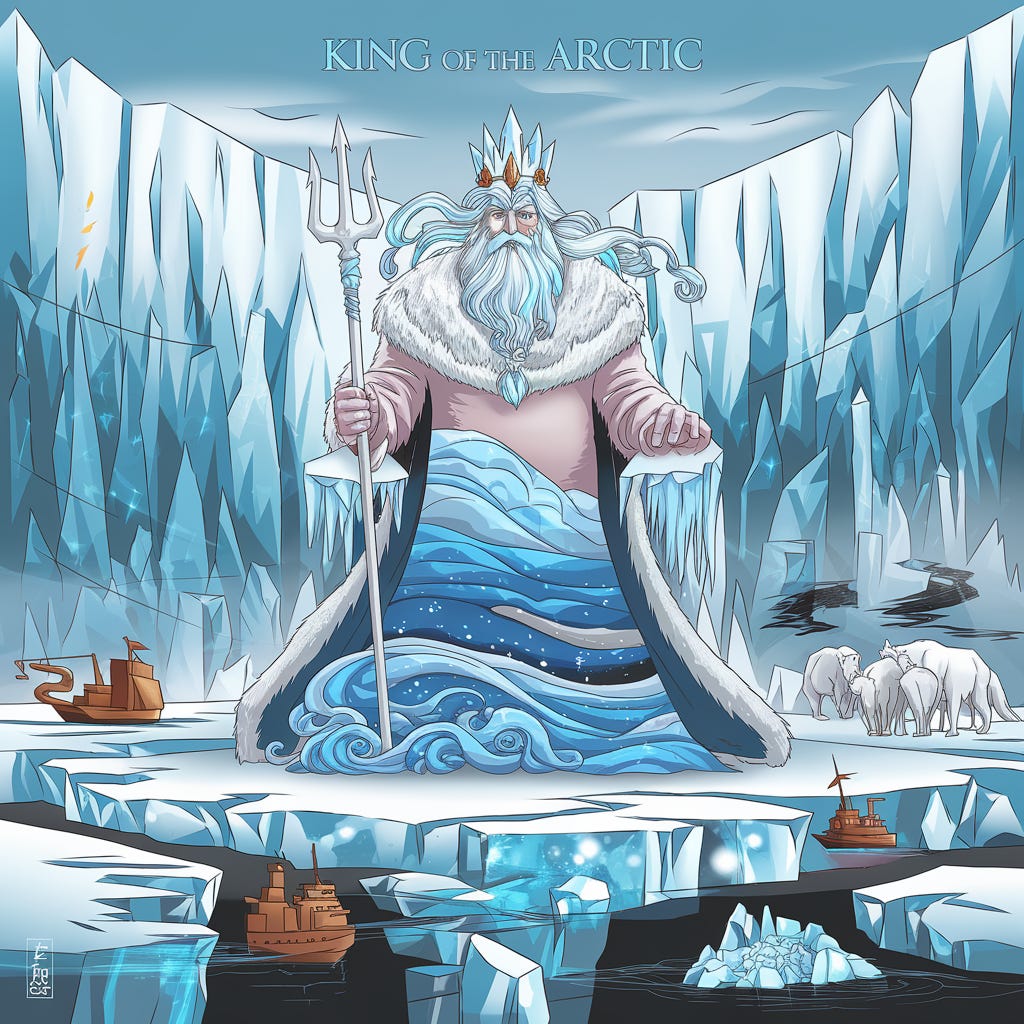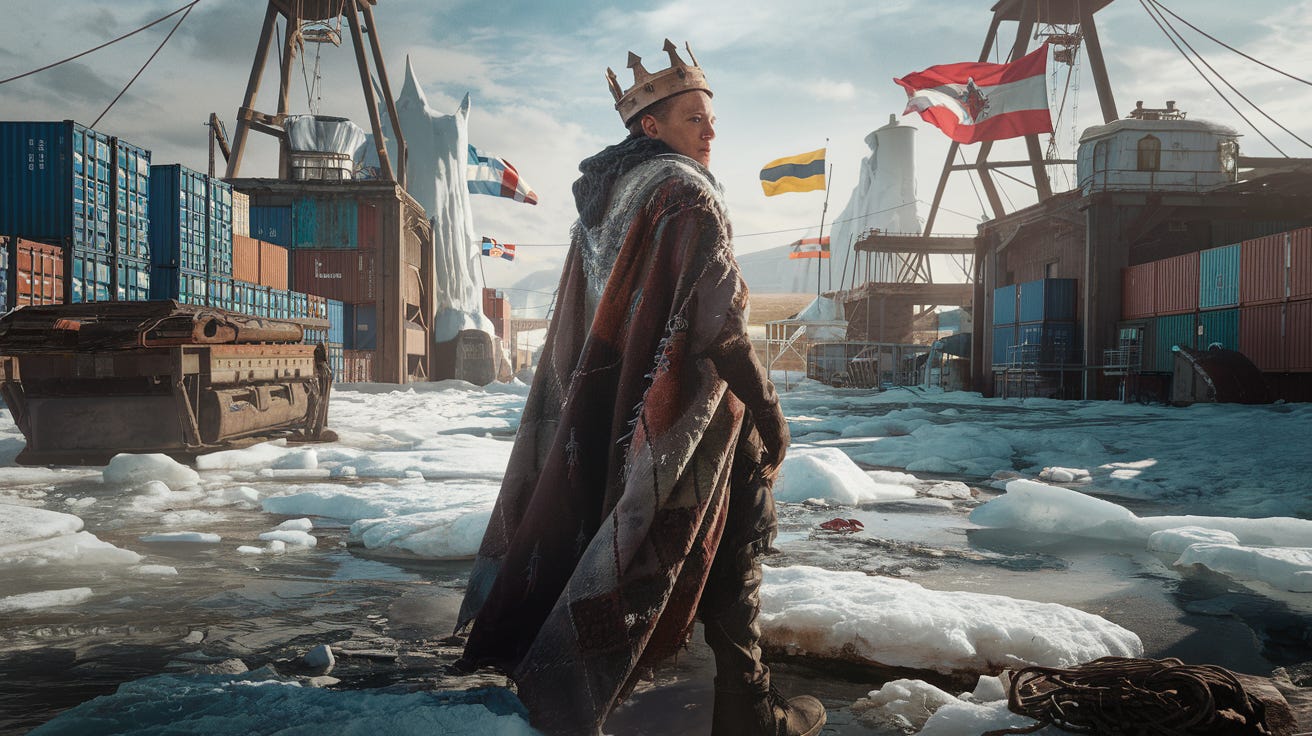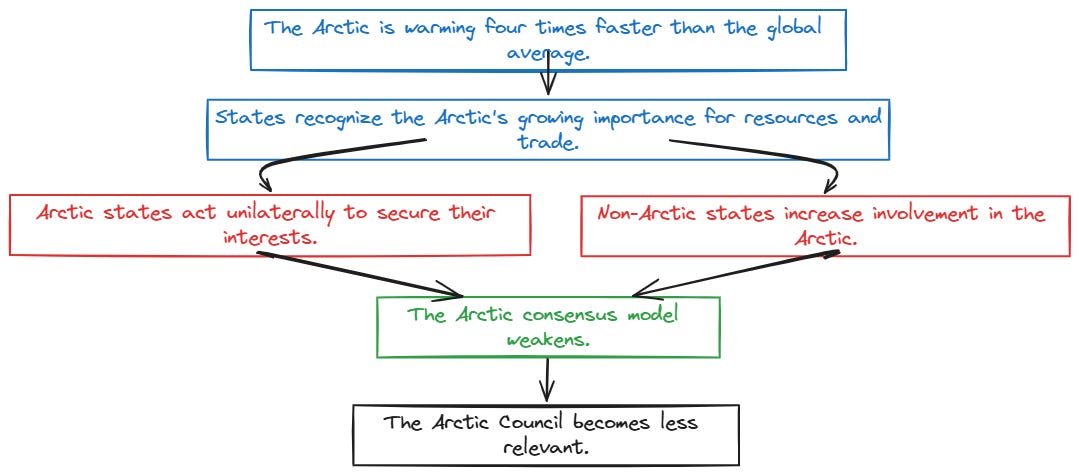I Hereby Declare Myself King of the Arctic👑
Can anyone just do what the F they want in the Arctic?
This is Pt. 5 of the “It’s Getting Hotter in the Arctic” series. For the first part of the series, click here, for the second part click here, for the third part click here, and for the fourth part, click here. Ice guaranteed! 🧊
Your tenure as the Arctic Ambassador isn’t going so well. You’re tired of the Polar Silk Road, and it really feels like a wild, wild north out there. It’s as if no one cares about what’s at stake. You have good sense of what’s right, but it’s pretty clear that between one Chinese air patrol and another NATO exercise, no one’s listening to you. If it were up to you… if only you were King of the Arctic, everything would have been great, you think to yourself.
Hey… now that’s a thought!💡
We’ve been spending the past few months in the thawing Arctic, navigating between nation states as they flex their muscles💪 and scramble for shipping lanes🚢 and natural resources🥇.
At this point, you must be wondering: Can anyone really do what the F they want in the Arctic? Can I (or you for that matter) declare myself King of the Arctic (or CEO of the Arctic, if you prefer free markets over a monarchy)?👑
The short answer is not really. But if you’re a nation state, it gets complicated.
Intro to Arctic Governance
Like the permafrost that is changing underneath our feet, so are the basic (human) laws that govern the Arctic are at a crossroads. Traditionally, the Arctic was a place of collaboration, where humans banded together against mother nature’s cruel tests. Like the collaborative nature of human activity in the region, Arctic governance is based mostly on consensus and cooperation.
There are two main components in Arctic governance: The UN Convention on the Law of the Seas (UNCLOS) and the Arctic Council.
Setting the Record Straight: UNCLOS
UNCLOS is an international law convention that sets the parameters on what countries can and cannot do in both near shores and high seas. UNCLOS determines how countries can leverage natural resources. For example, it defines the Exclusive Economic Zone (EEZ), which lets a country take advantage of resources up to 200km from its shores.
While UNCLOS does not refer directly to the Arctic, it kinda sets rights of states. Since only 8 nation states share the Arctic geographically, it pretty much tells other countries to take a hike (China, I’m looking at you👀 your “Near Arctic State” isn’t fooling anyone).
UNCLOS does particularly deal with natural resources and ice (section 234), but leaves much room for interpretation, especially as climate change sinks its teeth into the Arctic. Also critical to our discussion is the ability to lay claims to extend the EE beyond the 200km line.
Governing the Region: The Arctic Council
The Arctic Council, established in 1996 through the Ottawa Declaration, was designed to create a framework for collaboration and joint management of the region. The Arctic Council is made of:
The Arctic Council is ruled by consensus, which means that Arctic states have to agree about pretty much anything unanimously before anything gets done. But as we'll see, this collaborative spirit is melting faster than the ice, leaving room for self-proclaimed Arctic royalty (me, that is).
You can already see where this is going…
Arctic Influencers and Northern Nobles
It’s been a few months, and you’ve been hard at work. Setting up your new kingdom isn’t easy: You raised startup capital, you fixed yourself a new castle inside a dilapidated deep sea port, and you’ve had to sign so many forms you almost wish you hadn’t. But it’s all worth it: Dominion of the Arctic is now it’s own Arctic State, with a seat at the Council and everything. You even have a flag. You couldn’t be happier!
The Arctic is formally governed by consensus. Anyone who spent a minute reading about the Arctic in the past few years can see the problem: Most movers and shakers in the region don’t give a damn.
Who’s Doing What
Over the past few years, as different actors (states, companies) are trying to flex their muscles and create a posture within the region, there is an increasing encroachment on Arctic governance.
As traditional governance structures crumble, various actors are carving out their own Arctic fiefdoms. Let’s see who’s doing what:
States:
US:
Conducts FONOPs in Canada’s Northwest Passage, challenging its sovereignty.
Strengthens NATO ties and reactivates Arctic military bases.
Expands seabed mapping to claim Arctic resources.
Really wants Greenland.
China:
Promotes the Polar Silk Road through investments in Arctic infrastructure.
Uses icebreakers for dual-purpose scientific and strategic missions.
Self proclaims itself as a Near Arctic State.
Sheesh, with such creative interpretations, who's to say you can't crown yourself Arctic monarch?
Canada:
India (yeah, India!):
Creates an Arctic Strategy (even though they are really far away…)
Expands its presence through Arctic Council observer status.
Russia: LOL c’mon, you know Russia keeps on doing whatever it wants in the region (one example is here).
Non-State Actors:
Shipping Majors and non-Profits form the Clean Arctic Alliance to create new frameworks for sustainable shipping practices
Rosneft sets private standards for resource extraction in the Arctic.
This growing list of activities is done… you guessed it - without consensus or asking anyone.
Why? Because they can.
A Growing Rift in the Arctic-Space Continuum
These activities show a growing rift between the official, consensus-driven governance structure of the Arctic and how things take place in practice. Clearly, more and more nations recognize the importance of the Arctic to their interests and are making moves to either assert their dominance or call for a say in the region (hey India i’m looking at you!).
🤠 Hold on to your cowboy hats: the Arctic isn’t lawless. But, in recent years, instead of using the Arctic Council, both countries and private actors resort to alternative arrangements that bypass the consensual mechanics of the Council.
Basically, this is what’s happening:
Yes, it’s more complicated, but you get the point.
Nature abhors a vacuum, the old saying goes, and this case is no different. It looks like that in the Arctic, that vacuum is being filled by a motley crew of self-appointed Arctic influencers and would-be northern nobles (I’m definitely on my way to a fitting of my icy crown)🫅
The growing interest in the Arctic and the growing appetite of nations and corporations to flex their muscles in the region creates a plethora of frameworks and agreements that create different “mini regimes”.
The Many Faces of Arctic Governance
Yeah, there are plenty of agreements out there that bypass the Arctic Council: the 2011 Arctic Search and Rescue Agreement (Nuuk, Greenland); the 2013 Agreement on Cooperation on Marine Oil Pollution Preparedness and Response (Kiruna, Sweden); the 2017 Agreement on Enhancing International Arctic Scientific Cooperation (Fairbanks, Alaska); the 2018 Central Arctic Ocean Fisheries Agreement (Ilulissat, Greenland), and many more.
Discombobulated? So am I.
So I decided to segment this hodge-podge of Arctic agreements into four pillars. In order for this not to get boring, I created an AI-generated infographic for you:
This hodge-podge of mini-regimes signify an era of fragmentation in Arctic governance. The big question on the table is: what does the future hold for the Arctic Council at an era of intense geopolitical and economic competition? Can the world come together and collaborate as it used to?
To be fair, as the Arctic becomes more accessible, I can kind-of see the point of non-Arctic states. The growing importance of the Arctic isn’t recognized fully by the current structure of the Arctic Council, which gives Arctic States almost full control over the region and its future. Countries like India, China and others are right to wonder: hey, why can’t we get a piece of the action?
I’m not a fortune-teller, but it seems to me that the hotter the competition over Arctic opportunities are, the less countries will be willing to collaborate, rendering the Council less effective and relevant. This will open it to being significantly challenged by the growing appetite of various actors to flex and stake a claim in the region.
Who knows, we might even see an Arctic kingdom or two (one of them is mine) 🤷🫅
Ok Who Cares?
It’s been a while, and you finally understand the phrase “heavy the head that wears the crown” (literally, yours is made of solid gold…). You thought your Arctic fiefdom will help you put everyone in line. Instead, you spend your days signing fishing licenses and battling your cousin, who thought he can build his own little kingdom under your nose. And at the end of the day, the Arctic isn’t better off. People listen to you now, sure, but you now have investors (who want 💰💰💰), subjects (who want 🍞🍓🍅) and enemies (who want… you know). Suddenly being an ambassador sounds a little… easier.
It’s easy to discount the growing rift between official Arctic governance and how things unfold in practice as bureaucratic nonsense (especially in the days of DOGE). I get it, it sounds a bit pointless to deal with councils and working groups when the world is on fire.
But… (there’s always a but)
👉 The Stakes Are High: The Arctic’s role in the future of the planet and human societies that live on it (economically, geoplitically, environmentally) is too important to be left to bottom-up developments. Governing the Arctic in a way that benefits humanity is important.
👉 The Price Will Be Paid in Installments: Actions have consequences, and the price will be paid by the rest of us in installments, as different regimes and agreements will conflict with one another and will send ripple effects on trade, international tensions, the environment, and even our purse strings.🪙
👉 Power Vacuum Paradise: As governance structures weaken, the Arctic becomes a playground for those bold (or foolish) enough to stake their claim. Today's Arctic explorer could be tomorrow's Polar Prince.
👉 This is a Recipe for Disaster: Sure, let’s leave a place that is both unforgiving and incredible fragile up for grabs. What could possibly go wrong?
It turns out anyone can really do what the F they want. The problem is that there are going to be consequences for the rest of us.
What should/can we do about it?
Personally, I’ve already commissioned an architect for my Arctic Castle.
The obvious answer would be to strengthen the Council, but I’m not sure that going back to the consensus-based model is the right approach. On the other hand, the regulatory fiefdompalooza isn’t going to get us far either. Instead, the answer might lie in structural changes in the Arctic Council to allow for more competition, but also make sure it doesn’t go crazy. That’s what we should do about it.
Still, as I’m writing these lines, I remain not very hopeful about our ability to fight the very human tendencies to compete for resources and power. In other words, there may not be anything we can do about it.
Can we avoid turning the Arctic into a lawless frontier and in the process do more harm than good? I sure hope so.
Seriously Can I Be King Here?
Ok, since I can’t be king, we’re off to our next stop… the future of the Arctic!











